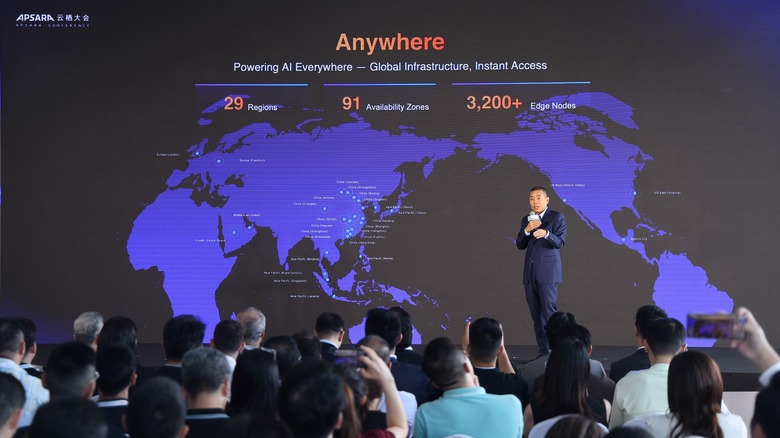Alibaba Claims It's Beating OpenAI And DeepSeek At Their Own Game
The hottest name in the artificial intelligence world is making moves — and it's not who you think. Alibaba, China's preeminent e-commerce giant, has steadily scaled its investment in the emerging technology since 2021, when its research and technology unit first announced its M6 AI system. Since then, Alibaba has quietly built itself into one of the world's largest AI companies, culminating in a recent push that saw its AI system Qwen reportedly outperform models from competitors OpenAI, DeepSeek, Meta, Google, and Anthropic in several key benchmarks. In particular, Alibaba executives highlight Qwen's autonomous decision-making, a key aspect of the move toward independent AI systems.
The company's September 2025 Apsara Conference in Hangzhou, China, saw the tech titan debut its latest multimodal AI platform, Qwen3-Omni. Qwen3-Omni, along with the Qwen3-Max model, which launched earlier this year, has the company ready to compete against domestic rivals like DeepSeek and Tencent as well as on the international stage. Powering these models will be a slew of new global data centers, reflecting the company's increased presence abroad.
Despite the prowess of these programs, the most important development announced at the Apsara Conference may be Alibaba's partnership with Nvidia, which comes despite Beijing's directive banning companies from acquiring Nvidia chips. And although the details are scarce, Alibaba has praised the agreement as a springboard for its physical AI tool offerings and cloud-based system designs.
The new Qwen3 suite
Alibaba has released several versions of its open-source Qwen LLM model in 2025, including an update to its flagship program, Qwen3-Max, launched in April 2025. According to the e-commerce giant, Qwen3-Max was trained on over 1 trillion parameters, making it the company's largest model to date. Alibaba touts the model's strength in internationally recognized benchmarks, like Tau2-Bench, which measures a model's ability to reason and guide user prompts, with particular focus on its code generation and autonomous agent functionalities. The company claims that Qwen3-Max ranks third on the Text Arena leaderboard, an open-source AI ranking system created by researchers at UC Berkley. Alibaba executives claim Qwen3 can achieve outcomes with fewer human prompts than competitors like ChatGPT, paving the way for more autonomous, independent AI systems.
At the September 2025 Apsara Conference, the Hangzhou conglomerate debuted Qwen3-Omni, a multimodal AI for immersive applications, capable of handling virtual and augmented reality functions. The application will be able to run on diverse interfaces, ranging from smart glasses to cockpits. Functions include audio processes, video analysis, speech generation, image comprehension, and intelligent text formulation. The new Omni model reportedly achieves open-source state-of-the-art (SOTA) on 32 benchmarks, according to Alibaba, outperforming GPT-40-Transcribe, Gemini-2.5-Pro, and Seed-ASR.
The Qwen3 suite of AI models is a big step in China's pursuit of homegrown AI technologies. The achievement is noteworthy within the context of Western firms' lucrative AI arms race, as the Chinese firm has achieved similar performance metrics with lower developmental overhead, spooking some Western observers.
Alibaba's expanding AI investments
The biggest insight from the conference may be Alibaba's AI investment plans. According to executives, the company is doubling down on the technology, upping the ante after it already invested roughly $53 billion into AI initiatives earlier this year. At the center of Alibaba's renewed push is its new partnership with semiconductor giant Nvidia. The collaboration will center on Alibaba's cloud-based system designs, integrating Nvidia's Physical AI suite into Alibaba's cloud platforms to enhance its model training, data synthesis, environmental simulation, autonomous driving, and validation testing.
The announcement comes at an interesting time for Nvidia, as the chip conglomerate recently announced an investment of up to $100 billion in Alibaba's competitor, OpenAI. With this new agreement, however, Alibaba could see another major leap for a cloud business whose revenues skyrocketed by 25% in August 2025.
Alibaba plans to power these initiatives by expanding its global data center network, adding facilities in Brazil, France, and the Netherlands to its roster while growing its presence in Mexico, South Korea, Malaysia, Dubai, and Japan. To date, Alibaba operates 91 data centers across 29 regions. So far, it is unclear whether the new facilities will sport Nvidia-built chips, a key development considering Beijing's September 2025 ban on domestic tech companies from purchasing the Nvidia RTX Pro 6000D, the semiconductor giant's China-specific chip offering. Alibaba reportedly possesses its own chips and Ultra Ethernet technology, making its rapid expansion a potential boon for a Chinese market looking to sever its interdependence with Western competitors.


